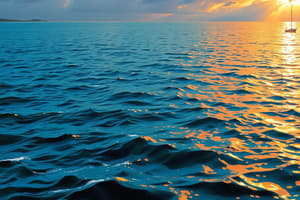Podcast
Questions and Answers
What is the study of geography primarily concerned with?
What is the study of geography primarily concerned with?
- Creating maps and cartography
- Understanding Earth's landscapes and environments (correct)
- Studying the history of Earth
- Exploring the universe beyond Earth
Who is considered the Father of Geography?
Who is considered the Father of Geography?
- Eratosthenes (correct)
- Socrates
- Aristotle
- Plato
What does the term 'geography' directly translate to?
What does the term 'geography' directly translate to?
- To map the world
- To study the universe
- To understand human society
- To write (about) the Earth (correct)
What does the study of geography involve?
What does the study of geography involve?
What are some of the areas that geography can be broken down into?
What are some of the areas that geography can be broken down into?
When was the official zero latitude determined to be the Greenwich Meridian?
When was the official zero latitude determined to be the Greenwich Meridian?
What was the purpose of creating the National Geographic Society in 1888?
What was the purpose of creating the National Geographic Society in 1888?
What was the revolutionary feat for the field of geography in 1962?
What was the revolutionary feat for the field of geography in 1962?
What did the use of satellites in the 1960s assist in?
What did the use of satellites in the 1960s assist in?
What is the present-day focus of geography as mentioned in the text?
What is the present-day focus of geography as mentioned in the text?
Which discipline is part of physical geography?
Which discipline is part of physical geography?
What is another name for human geography?
What is another name for human geography?
Who calculated the Earth's circumference around 240 B.C.?
Who calculated the Earth's circumference around 240 B.C.?
Which map, created in 1508, was the first to include the Americas?
Which map, created in 1508, was the first to include the Americas?
Who contributed to geography by creating the first isothermal chart in 1817?
Who contributed to geography by creating the first isothermal chart in 1817?
Flashcards are hidden until you start studying
Study Notes
Overview of Types of Geography
- Geography is divided into physical geography, focusing on natural events, and human geography, analyzing how humanity has impacted Earth's development.
- Physical geography includes disciplines such as glaciology, geomorphology, climatology, meteorology, hydrology, oceanography, biogeography, pedology, and ecology.
- Human geography, also known as anthropogeography, studies how humans have shaped the Earth through practices and ways of life.
- Sub-outlets of human geography include political geography, economic geography, health geography, urban geography, military geography, cultural geography, and population geography.
- The study of geography dates back to around 200 B.C., with Polynesian cartographers creating maps around 1500 B.C. using sticks and shells.
- Greek scholar Eratosthenes calculated the Earth's circumference around 240 B.C., leading to the invention of the compass 40 years later.
- The age of exploration began around 1500 A.D., with expeditions by Marco Polo and others to chart areas in the Middle East, Asia, Africa, the Caribbean, and America.
- The Waldseemuller Map, created in 1508, was the first to include the Americas, and it is considered a major development in geography.
- During the Renaissance, "The Geographia Generalis" by Bernhardus Varenius and Gerardus Mercator's world map laid the groundwork for modern geography.
- Alexander Von Humboldt contributed to the study by expanding on the terrain, flora, and fauna of the Earth through his study of South America and creating the first isothermal chart in 1817.
- By the early 19th century, geography was recognized as an important discipline and was being taught in universities across Europe.
- In 1830, the Royal Geographical Society was founded in London to support further research into the field.
Studying That Suits You
Use AI to generate personalized quizzes and flashcards to suit your learning preferences.




